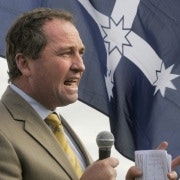Abbott's fumbled fiscal policy
The sporting clich is you only play as well as your opponent allows you. The alternative is occasionally true, too: sometimes you play as badly as your dud opponents.
With the spotlight on the Labor leadership stoush and the Carr-for-Canberra reverse wedgie ( Andrew Probyn), the pressure, to the extent that they've been under any pressure since April 2010, should have been off the Coalition. Instead, there's been a series of fumbles and unforced errors.
There was Abbott's "I'll be prime minister” line, the sort of thing not so much hated by voters as claimed by press to be hated by voters, and covered accordingly. Then there was the reaction to Bob Carr's appointment, after the Coalition had spent last week basing its entire political attack on the government over his non-appointment; the indefatigable Christopher Pyne was sent onto Lateline on Friday night to perform the alarums and excursions necessary to cover the retreat on that front, only to be forensically dissected by Emma Alberici.
And then there's the Coalition's budget problems. The Coalition is in a deep, deep hole on its budget plans, but judging by the noises coming out of the darkness, they're still digging.
As former Gillard adviser Stephen Koukoulas pointed out this week, Joe Hockey, in committing to have a lower tax:GDP ratio than Labor, casually signed up to finding an extra $80 billion-odd in savings over forward estimates. Even if it's delayed until the first Hockey budget in May 2014, it'll cost an extra $24 billion.
Yes, that's on top of the current $50-70 billion they need to find. If you had some magical combination of Peter Walsh c.1987 as finance minister and Peter Costello c.1996 as treasurer, you'd still be struggling to achieve that level of savings.
Then there's paid parental leave, Abbott's totem for his conversion from a 12th to late 20th century view of women. It's hard to avoid the impression that Andrew Robb, despite subsequent backtracking, let the cat out of the bag on the scheme this week when he said nothing had been finalised. At the very least, it's a preview of the stoush likely to happen in ERC and budget cabinet in the lead-up to May 2014.
The problem for the Coalition scheme isn't just its huge cost compared to Labor's scheme, which is based on the national minimum wage: the minimum wage will be the baseline of the Coalition scheme, but anyone earning above that will receive up to $75,000. It's that the scheme will grow much faster than Labor's.
That's because the national minimum wage grows more slowly than average weekly earnings for women. The minimum wage has grown on average 2.7 per cent per annum since 2008 – although it wasn't increased at all that year. Full-time adult female earnings grew on average 4.7 per cent per annum over the past five years. In 2007, it grew at 5.4 per cent. The Coalition, correctly indexed the scheme cost at 4.7 per cent on its 2010 costings. On that basis, the scheme will cost $4.7 billion in it first year and total about $20 billion over forward estimates and keep growing rapidly. In years with high jobs growth, faster wages growth will accelerate that growth.
That $20 billion figure is a lot of money to fix Tony Abbott's problem with women voters. There are image consultants who'd charge a lot less and, judging by Abbott's current unpopularity with women voters, do a better job.
There remains, too, the problem of the Coalition's costing of its direct action policies on climate change. This is grossly underfunded in terms of the price per tonne of abatement, if we assume the Coalition is at all serious about achieving a 5 per cent reduction target by 2020, let alone any more ambitious targets. The fact that few in the media other than Lenore Taylor have focused on the profound problems of this policy doesn't mean a Coalition government won't have a serious funding problem with the policy. For the moment, however, the opposition's stance on this revolves sticking its collective fingers in ears and chanting "not listening.”
Joe Hockey is giving an economic speech early this afternoon intended as The Australian Financial Review declared today, to be a "spine stiffener” for the opposition. The real job the Coalition's economic team needs to do is start giving comfort it's not totally at sea on its fiscal strategy. Sooner or later reality will hit.
This story first appeared on www.crikey.com.au on March 7. Republished with permission.













